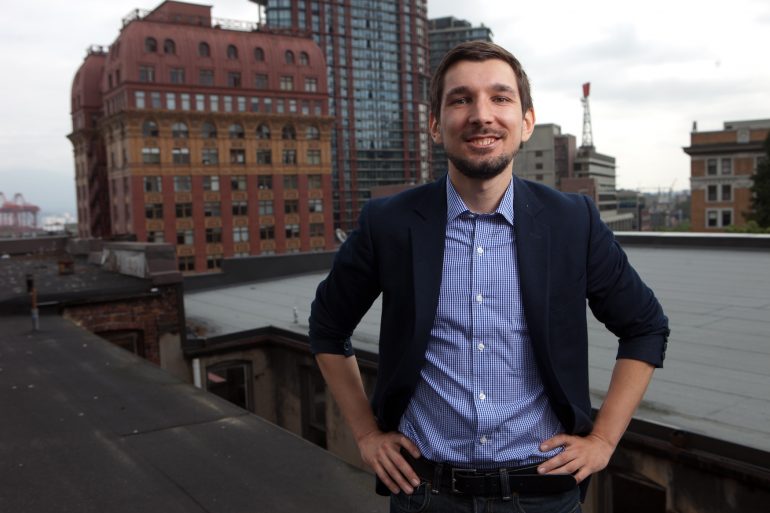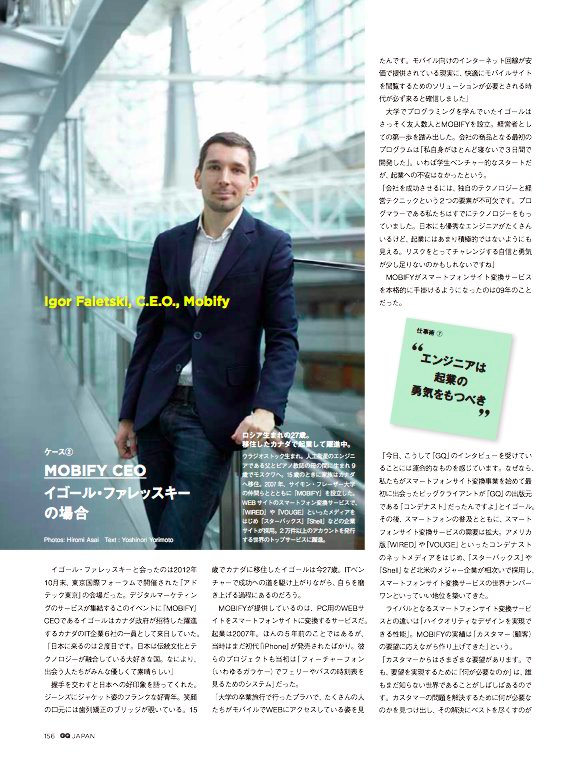Mobile is massive and it’s getting more so everyday. Yet for all of the phones, the tablets, and what I pay my wireless carrier, the mobile web still largely sucks. Everyday I either search for something or click a social web link, and wonder why I even bother. By now I’ve quit counting my sarcastic mutterings, “nice mobile optimization, you totally fail user experience 101.”
Being curious about the future of the mobile web and other things, I recently had a conversation with Mobify’s CEO and co-founder Igor Faletski. Rumours around the Vancouver startup community suggested he’d know a thing or two. Turns out the rumours are true. The young guy who moved to Canada with his family from Vladivostok, and co-founded the company with SFU classmates John Boxall (CTO) and Peter McLachlan (Chief Architect) in 2007, has a lot to share.
Flashback to the state of the art for cell phones in 2007: there’s not really a connection between the phone and software apps as we know them today. Faletski shares that “starting the business kind of just happened to us. While in Prague studying, drinking beer and reading Kafka, we saw phones with colour screens and being marketed as a platform.”
The real ah-ha moment was realizing “if I can play a game and make a game, why can’t I write an app that would be useful for my productivity, and my work… this is coming, this is going to be big, we need to do something about it,” thought Faletski. “We saw that mobile and software was going to change the world, but didn’t know how. We decided to take on the challenge of doing something for the phone, rather than the desktop.”
We might still call it a phone, but the time we spend surfing, gaming, sharing pictures, or socializing exceeds the minutes we spend talking. The way Faletski sees it is “how we use our devices isn’t about the phone, it’s about apps, and remember the browser is an app too. The way websites present themselves to users will drastically change. Websites will soon, more and more feel like native apps do…instant, personalized.” His mission is making this come true.
“We’re bridging the gap with new technology, allowing developers to build faster web sites, optimizing them for all screens, and making the web more user friendly, responsive, and an overall better user experience.”
The world moving to a ubiquitous computing experience, and the notion of a screen hierarchy is giving way to the experience of getting my information or entertainment anytime, anywhere, on any device. To Faletski, “people are now expecting companies to deliver the instant experience… answering questions or delivering information ‘now’ It’s about dealing with customer service through the website or answering questions via Twitter, and interacting with businesses anywhere and anytime via the mobile device and social web. This is a huge shift for how we live our lives versus just a technology change.”
He admits the iPad wave both caught them by surprise, and is now driving a whole new conversation.
The market has sped up so quickly. He also sees North America being fragmented in terms of accessing information by using the phone, tablet and laptop, whereas countries like China and Brazil are more phone-centric. Faletski says “these developing countries will be adopting more tablets as a work enabled device to compliment the phone, which will further impact the evolution of the web. There’s no question we need to prepare ourselves for a mobile-first and mobile-only future.”
When we talked content, Faletski had little doubt that aggregation of content is here to stay, courtesy of Facebook, Flipboard, PaperLi and the like. He thinks “aggregation won’t challenge the idea that the web is an open and ‘free to play’ experience with no gatekeepers.” He quoted Jeff Bezos, saying “even the kindest gatekeepers restrict innovation.” He said app stores are slowing down innovation: “the web is beautiful because it’s open and anyone can join it and make it better. To us the opportunity of helping people build the web is a bigger opportunity than aggregating content in one spot.”
The Mobify team currently stands at 70 people, and Faletski is looking toward starting 2014 in a new head office, and growing the team to north of 100. They have an office in London (UK), and a partner team in Tokyo, and he says business is “all about learning how to serve our global clients, and global team members.”
Having grown Mobify without external investment, Faletski shares one of his most important challenges involves “maintaining the culture as we grow. Culture evolves over time, but values stay more or less the same. I’m really cognizant of the fact that while we focus on our vision, revenues and growth it’s important not losing the culture we’ve built, and making sure that every year we’re a better company to work for.”
Knowing Faletski has entrepreneurship hard wired into his DNA, as is evident from his TEDxSFU talk in September, I closed our conversation asking him to give out advice for the three person startup toiling away in some coffee shop. Without hesitation he simply says “get to the first dollar quickly, regardless of the plans to bootstrap or raise funding… things you create need to be useful to people, and money is a great metric to validate the usefulness of your product.



